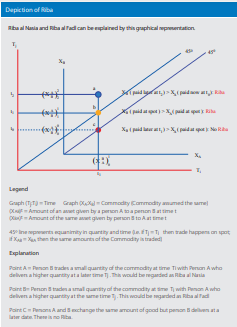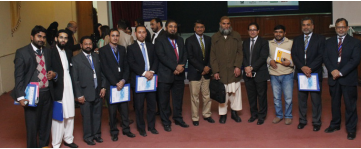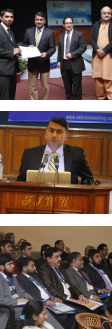
Islamic banking and finance is in the second phase of its growth and development in Pakistan where existing financial institutions are expanding and new ones are being established to cater to the growing demand. This has in turn given rise to the need for qualified and well-trained human resources in order to keep up the pace.

There is no doubt that high-quality education in Islamic banking and finance is a prerequisite for starting a successful career in this field. This was obviously not the case during the first phase of the development of Islamic banking and finance, when any banker and finance practitioner who had interest and passion for Islamic banking and finance had opportunities to excel in the then newly emerging industry. Edbiz Consulting organized its flagship programme IFAP for the first time in Pakistan on the 16th & 17th of December 2013. The two-day training workshop was held at the Fatima Jinnah Women University Rawalpindi. Delegates included practitioners from Meezan Bank, Bank Alfalah, UBL Ameen, MCB, Soneri Bank, Habib Metropolitan Bank, MCB-Arif Habib Savings & Investment Limited and HBL. Academics included faculty members from Quaid e Azam University, Bahria University, University of Arid Agriculture Rawalpindi, SZABIST, National University of Computer & Emerging Sciences, IIUI and FJWU.
The workshop began with an opening address by the Vice Chancellor of Fatima Jinnah Women University Dr Samina Amin Qadir followed by a few comments from the Dean of Faculties, Dr Naheed Khan. Both women stressed that there is a lot of potential for the Islamic banking. However, Dr Samina remarked that the financial crisis has traumatized economists and current economic system yet Islamic economics, banking and finance has still to prove itself as a viable alternative.
Dr Humayon Dar, who travelled to Pakistan from UK for this IFAP, delivered the core training. A veritable tour de force, Dr Dar’s lectures proved once again why he remains a leading thinker and trainer in Islamic banking and finance. His lectures encompassed a broad range of topics beginning with an introduction to Islamic banking and finance and an insight into Riba and Gharar followed by an insight into the evolution of Islamic banking and finance in Pakistan and the components of the Islamic banking industry. This was just Session 1.

For the second session, Dr Dar put on his legal hat on to discuss the classical Islamic contracts that have been modified for present-day exigencies. It is often forgotten that classical IBF contracts were structured according to the commercial situation of a pre-modern society. The connection with the present is tenuous at best, especially in the realms of finance. Classical contracts were typically trading contracts and not financing ones. However, to continue with that sort of thinking would have rendered Islamic commercial thinking stagnant and difficult to apply. Nevertheless, universal principles pervade in the classical contracts that can be used today. The principles of Riba and Gharar are still as important today, if not more so, as that of yesteryear. From these two key pillars, classical Islamic law developed its own system of contractual law.
Both pillars concern exchange of goods. In the exchange, there is a transfer of ownership which can be affected by way of aqd (contract) or waad (promise). Only the latter can be unilateral (I promise you) or bilateral (I promise you and you promise me). Contracts are typically the latter, but there are instances of unilateral contracts such as gifts, loans and endowments. Promises are a controversial aspect of today’s Islamic finance industry due to the debates about whether it is binding or non-binding. Most scholars are of the view that each promise in its unilateral sense is binding; but the two together are not acceptable (i.e., the combination is similar to a forward contract and hence not permitted). The Islamic law of contract is very similar to the common law concept of contract in that for a contract to exist there needs to be offer and acceptance, consideration and intention to create legal relations. (Although this is not strictly how Islamic scholars described the contract). Major building blocks of a contract also included the state of contracting parties (sane or insane) and the subject matter. In considering all these elements of a contract, results in a tripartite classification. If all elements are present, then they would be considered valid. If the elements are thereby certain conditions are not met (for instance, the price is uncertain) then it the contract is voidable. If an element is missing or does not meet the criteria (e.g. the subject matter of the contract is alcohol) then the contract is considered invalid and has failed to create a binding relationship.
There are many different types of bilateral contracts. Each has their own elements and conditions. Transplanting these contracts into the modern day requires a deep understanding of both Islamic and conventional legal approaches to contracts. In a globalised world, one marked by complexity, profound comprehension has led to interesting innovations Islamic legal thinking. One particular, and pervasive, issues is the law behind foreign exchange transactions and the trading of currencies. AAOIFI Shari’a standards have helped clarify the parameters of foreign exchange transactions, which are susceptible to ribawi consequences. According to their standards regarding the permissibility of trading in currency:
• Both parties take possession of the counter values before the exchange
• Counter values of the same currency must be of equal amount
• No conditional option or deferment regarding the delivery
• Should not be carried out on future or forward markets
• Hedging against the future devaluation of currency is permissible
These contracts are being applied in conventional banks. Dr Dar explored this in session three where he broke down the contract and it’s utilization in different Islamic banks. He explained the two-tier Mudaraba, a remarkable innovation for the Islamic banking industry. Depositors, as investors, invest with Islamic bank that acts as agents. The Islamic bank then becomes the investor using, in part, income accrued from depositors, to provide funds to clients in a Shari’a-compliant manner.
| Bilateral Contracts |
| Muawadat (contracts of exchange) |
| Damanat (contracts of security) |
| Shirka (contracts of partnership) |
| Wadia (contracts of safe custody) |
| Manfa’a (contracts of usufruct transfer) |
| Wakala, Ju’ala (contracts rewarding for a specific job) |
| Sarf (currency transactions) |
Partnership contracts foster equity relationships and not debt relationships. The philosophy and the content of the relationships between partners are far different as compared to relationships between borrower and creditor. It was a scheme of commercial action advocated by early proponents of Islamic banking and finance, but has unfortunately been somewhat marginalized due to the risk disparity Nevertheless, deposit accounts, housing finance, and funds are still based on partnerships.
A more popular structure used by Islamic banks has been Murabaha. This has generated much criticism as the Murabaha resembles a conventional interest-based loan. Dr Dar stressed the differences between two while identifying the differences in practice between Malaysia and the GCC countries. He spoke briefly about Tawarruq before a greater exposition on Ijara, Salam and Istisna in the modern world. He made final remarks on letters of credit and guarantees, once again revealing the tension between conventional commercial practices and Islamic legal thinking. These tensions can, and are, being resolved allowed less encumbered trades to take place. Flexibility and adaptability are key for the progress of Islamic banking and finance, but it has to be anchored by the Islamic law.
| Major contracts used by Islamic banks | |
| Contract | Specifications |
| Murabaha | “Fixed income” contract credit sale on instalments + mark-up Minimal exposure to the asset IB must study the credit rating of Assets & Clients IB must perfect its liens on the sold asset |
| Ijara | “Fixed income” contract Lease instalments Minimal exposure to the asset IB must study the credit rating of Assets & Clients IB must insure it has control over titles of the asset |
| Salam/Parallel Salam | “fixed income” contract Forward sales/purchases with profit mark-up Minimal exposure to the client IB must ensure that goods could be delivered according to specifications and timetable |
| Istisn’a / Parallel Istisn’a | Similar to project financing IB must ensure that goods could be delivered according to specifications and timetable IB must ensure that the purchaser (parallel istisn’a) is able to pays instalments and buy manufactured goods. IB must perfect its lien on the asset |
| Musharaka | Profit & Loss sharing = equity Profit depends on the profitability of the project IB applies risk mitigation techniques (whenever permitted) |
| Mudaraba | Profit & Loss sharing = equity Profit depends on the profitability of the project IB applies risk mitigation techniques (whenever permitted) |
The presence of one of the founding directors of Akhuwat, Mr Muhammad Saleem Ranjha, provided an interesting turn to the IFAP. Dr Dar gave participants an extensive overview into the commercial aspects of Islamic finance; Mr Ranjha opened the doors of understanding of how Islamic finance can benefit the impoverished. Akhuwat is an extraordinary Islamic microfinance institution that rejects the interest-based model of conventional microfinance. Starting in 2001, Akhuwat has grown, building on a model that emphasises and optimizes community interaction. Mr Ranjha introduced to participants the structure, performance and success of the only Islamic microfinance institution in Pakistan. He emphasized on the need to help the poor through building new businesses or clearing their debts through interest-free loans called the Liberation Loans. The success of the interest-free loans scheme has led the Akhuwat management to start other projects in energy and education where they are currently in the process of building the first-ever tuition-free university. The university will be able to fulfil its requirement of electricity through its own power generation plant. It would also help the adjacent villages to get electricity as well. Akhuwat is the next generation Mit Ghamr: an Islamic finance institution that began a revolution in the way finance was conceived and practiced.
On the second day, the IFAP continued exploring technical aspects of Islamic banking and finance. The first session on diminishing Musharaka for home finance built on the lectures delivered by Dr Dar the previous day. Delivered by an experienced banker and a PhD fellow at the International Islamic University Islamabad Mr Amer Khalil-ur-Rehman, who with his experience of the industry as well as academia, took participants through the technicalities of the product. He explained the diminishing Musharaka practices of different banks nationally and internationally.
The Mudaraba sector in Pakistan is well-established. Mr Imran Hussain Minhas, Joint Director at the Securities and Commission of Pakistan for Mudarabas/Islamic Financial Institutions, was the speaker for the session. Mudaraba is perhaps the first acknowledged Islamic financial contract. The initial business relationship between the Prophet Muhammed and Khadija was structured as a Mudaraba. Today, this model has been modified, and one of the leading countries to innovate has been Pakistan. A regulatory framework governing Mudarabas is well established with four key pieces of legislation being promulgated since 1980 dealing with Mudarabas. These are:
| Differences between Murabaha and Conventional Loan | |
| Murabaha | Conventional Loan |
| IB: actual ownership, constructive or physical | Lender: no actual ownership |
| Closing date could be extended, no | Penalties added to the profit margin of |
| penalties added | the creditor |
| Early payment discounts are not welcomed | Possibilities of early payment discounts |
| Underlying asset could not be sold back to | |
| the original seller (bai Inah) (Except in | |
| Malaysia) |
• Modaraba Companies and Modaraba (Floatation and Control) Ordinance, 1980;
• Modaraba Companies and Modaraba Rules, 1981
• Prudential Regulations for Modarabas, 2004
• Shariah Compliance and Shariah Audit Mechanism 2012
Mr Minhas elucidated the regulatory requirements and procedures to the participants. He discussed registration, monitoring, the appointment of auditors, filing requirements, compliance and the protection of investors. Mr Minhas took time to go through the Shari’a compliance regime, describing the appointment of Shari’a scholars, their duties, screening criteria, the payment of dividends and the link with charities.
The final session of the day and of the IFAP was on Sukuk. Sukuk have been the most discussed product around the globe so the programme had a session on the structures of Sukuk being used around the world. Former head of Islamic banking at Saudi Hollandi bank Kamal Mehmood Mian was the key trainer. Kamal Mian has been part of some initial deals of Sukuk in the Middle East. He expounded the strength of Sukuk and its need in the modern world. The Shariah Standard issued by the AAOIFI defines the Sukuk as “certificates of equal value representing individual shares in ownership of tangible assets, usufruct and services or (in the ownership of ) the assets of particular projects or special investment activity.” From this definition one can see that Sukuk are a hybrid instrument that has both debt and equity profiles. Mr Mian went through the basic structure of Sukuk before embarking on a detailed exposition of the various iterations. The most popular structures used are the Ijara and Mudaraba Sukuk.
The IFAP concluded with closing remarks where participants received the HD Certificate in Islamic Finance. Chairman World Congress of Muslim Philanthropists Dr Tariq Cheema honoured the occasion and addressed the participants. Dr Cheema emphasized the importance of social responsibility and philanthropy in the modern world. Upon this bedrock, Islamic finance has grown. There have been criticism and obstacles and it is continuing to evolve but as this first IFAP in Pakistan has shown, there is much Islamic finance can offer both to the commercial and philanthropic sectors.





